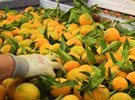Competition between private or cooperative companies in the citrus and fruit sector ends up displacing the inefficient companies, stated economist Adrià Girbés.
Valencian fruit cooperatives (especially the ones in the citrus sector) have fallen in the sales ranking; a drop that can be explained - in a broad sense - by their governing councils' lack of knowledge in management, production, marketing .
In general, the key issue is cooperative strategies, which correspond to the governing councils. Instead of having professional strategies, they follow routines that no longer work as things have changed. Detecting and adapting to change requires a lot of professionalism and training; something that successful private companies do.
This can be a real issue, as the management team should have a more qualified profile and be trusted.
Many cooperatives, in general, are also affected by other issues. Private companies, organizations, and public administrations, these sectors have introduced incompatibilities and controls to minimize the issues presented by the conflicts of interest, which can adversely affect them. This is something that cooperatives hardly implement.
The partners who have labor relations with the cooperatives in the bylaws should have a very limited representation since the worker groups (collectors, warehouse) are already represented by the corresponding company union committees. Furthermore, in all cases, if they are middle managers, their performance must be externally evaluated.
The cooperative companies must mimic the private company in aspects such as selection, hiring, promotion, and -where appropriate- the termination of employment relationships.
Being a large-sized company in the fruit sector implies –among other things– having lower costs, which is a requirement to be competitive. Market concentration implies that more second-degree cooperatives and cooperative mergers are needed. The formation of second-degree cooperatives is not without its problems, but it is the way.
The production level of cooperative members is predominantly very low and many farms are unable to implement available and profitable technologies (mechanization, transport, digitization...). In this sense, cooperatives are an ideal and necessary instrument to obtain larger surfaces. Cooperatives and the sector should take advantage of EU reforms for the necessary productive reorganization of citrus production, which -as a result of the pandemic- are oriented towards sustainability, digital transformation, and territorial balance.
For more information:
Adrià Girbés. Economist
adriagirbes@gmail.com
